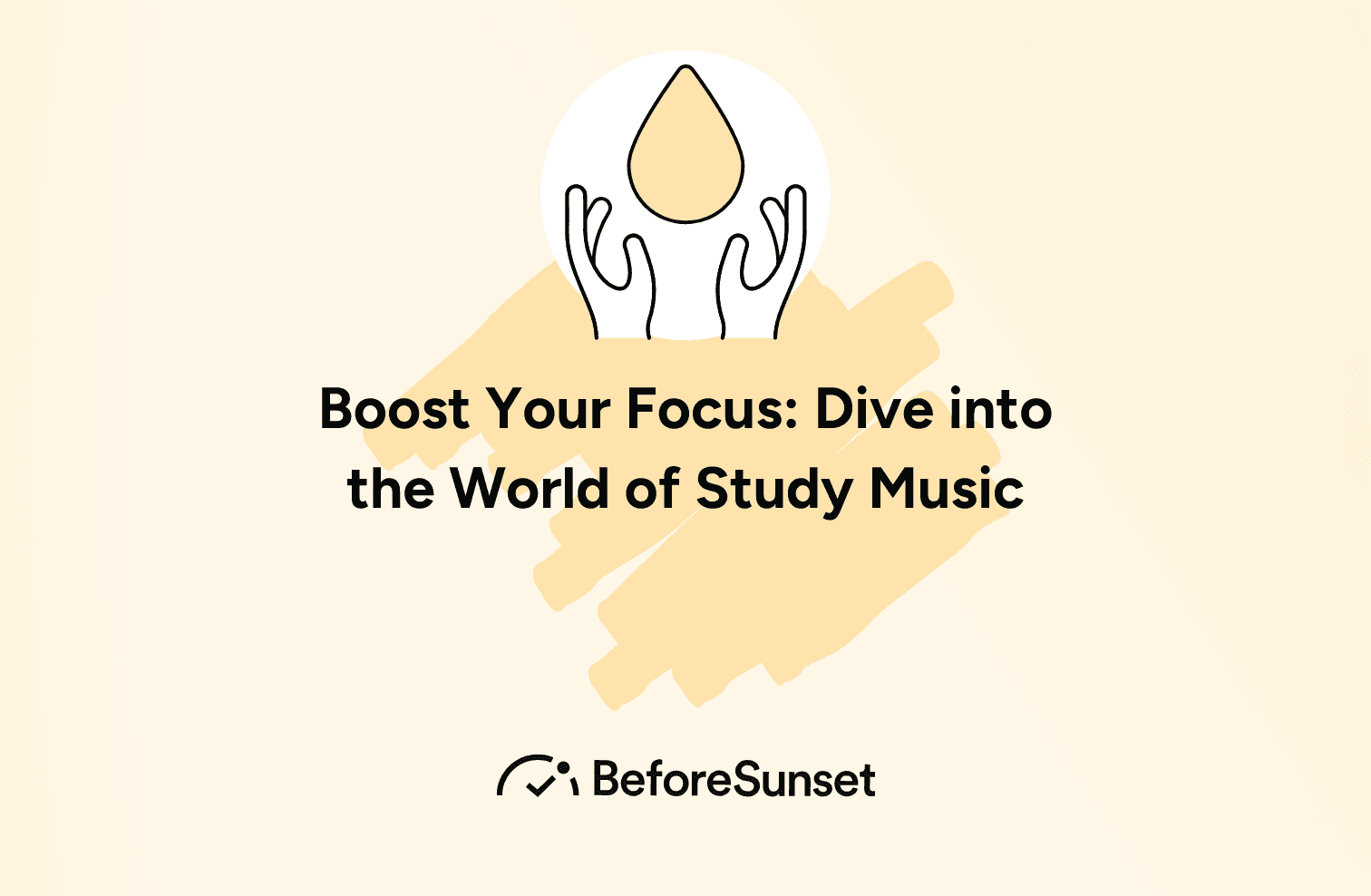We've all been there. Textbooks splayed open, highlighter poised, but focus feels like a fleeting dream. You crave a soundtrack to fuel your study session, but worry lyrics will become landmines for distraction.
Understanding Your Study Style
Before diving into genres, consider your learning style. Do you thrive on the energy of an upbeat tempo, or does classical orchestra music provide the calming focus you crave?
Perhaps movie soundtracks transport you to a world conducive to concentration, or maybe ambient music washes away distractions. Recognizing your preferences is key to selecting the music that unlocks your inner scholar.
Genre Gems: Unlocking Focus
Now, let's explore the musical landscapes that can enhance your study sessions.
Classical Contemplation: Classical music, often absent of lyrics, creates a serene atmosphere. Renowned composers like Mozart and Bach are popular choices, but explore! Find pieces that resonate with you – a soaring orchestral movement or a delicate piano concerto.
Lo-Fi Beats & Calming Companions: Lo-Fi music, characterized by its chill, often hip-hop-inspired instrumentals, offers a laid-back study companion. These "study beats" frequently incorporate natural sounds like rain or cafe chatter, creating a calming, familiar atmosphere that can boost your mood and concentration.
Movie Magic & Soundtrack Synergy: Ever lose yourself in the focus required to follow a captivating film? Harness that power! Movie soundtracks, particularly those from epic historical dramas or fantastical adventures, can provide a powerful backdrop for studying. Just be sure the chosen soundtrack isn't laden with bombastic action sequences that might break your concentration!
Ambient Ambience: Ambient music, often featuring electronic soundscapes or nature recordings, is designed to create a specific atmosphere. For studying, consider soundscapes that evoke serenity – think gentle waves or a crackling fireplace. This type of background music can be particularly helpful if you find yourself easily distracted by noises in your environment.
You might also like:
Upgrade Your Time Management: The Ultimate Check Planner Guide
Mastering Productivity: A Comprehensive Guide to Getting Things Done
Beyond Genre: Crafting Your Playlist
While genre offers a starting point, consider these additional elements when building your study playlist:
The Power of Familiarity: Music that holds positive associations can create a mood conducive to focus. Think about relaxing piano tracks you associate with peaceful evenings or movie soundtracks from films you enjoyed immensely. Familiarity can provide a sense of comfort and security, allowing you to delve deeper into your studies.
Tempo & Concentration: Faster tempos can be motivating, particularly when starting a study session or tackling a challenging task. However, for in-depth concentration, a slower tempo might be ideal. Experiment and see what works best for you! Some studies suggest that classical music with a tempo of around 60 beats per minute (bpm) can be particularly beneficial for focus.
Lyrics: Friend or Foe? While catchy lyrics can be distracting, some people find music in their native language, even with lyrics, enhances focus. The key is to choose music whose lyrics you don't find yourself actively listening to or singing along with. If lyrics are a concern, opt for instrumental music or music in a language you don't understand.
Natural Sounds & Relaxation
The incorporation of natural sounds into your study playlist can be a powerful tool. Nature sounds like rain, crashing waves or even gentle breezes can create a calming atmosphere that masks distracting background noise and promotes relaxation. Many popular streaming platforms offer playlists specifically designed for studying that incorporate these elements.
Finding Your Focus Zone
Beyond music, optimizing your study environment is crucial for maximizing focus. Here are some additional tips to create a focus zone:
Silence Distractions: Silence or minimize background noise like ringing phones or chatty roommates. Consider using noise-canceling headphones if necessary.
Find Your Focus Zone: Choose a well-lit, clutter-free space conducive to concentration. Having a dedicated study area can help signal to your brain that it's time to focus.
Power Up with Healthy Snacks: Keep your brain fueled with healthy snacks like fruits, nuts, or whole grains to avoid energy crashes. Avoid sugary snacks that can lead to a blood sugar spike and crash.
Embrace Breaks: Schedule short breaks (5-10 minutes) every hour to avoid burnout. Get up, move around, stretch, or grab a healthy snack. Taking breaks can help you maintain focus and return to your studies feeling refreshed.
The Science Behind the Symphony
Mozart and Bach, can improve memory and spatial reasoning. Other studies indicate that Lo-Fi music, with its slower tempos and chill vibes, can reduce anxiety and promote relaxation, creating a more conducive environment for studying.
However, it's important to remember that the effects of music on focus can vary depending on the individual and the type of music. Experiment and find what works best for you!
Tailoring Tunes to Your Study Space
The ideal music for studying can also vary depending on your environment. Here are some suggestions:
Library: A library is a place that typically demands quiet focus. Classical music, ambient soundscapes, or Lo-Fi beats can all be excellent choices for library studying.
Coffee Shop: Coffee shops can be bustling environments with background noise and conversation. Opt for music with a slightly faster tempo or masking white noise to block out distractions. Instrumental music or music in a language you don't understand can also be helpful in these settings.
Home: Studying at home allows for more control over your environment. Experiment with different genres and tempos to find what works best for you. If you find yourself easily distracted by household noises, consider using noise-canceling headphones or incorporating ambient music that masks those sounds.
Building Your Playlist: A Step-by-Step Guide
Ready to craft your ultimate study playlist? Here's a step-by-step guide:
Consider your learning style and preferences: Do you prefer classical music, Lo-Fi beats, movie soundtracks, or something else entirely?
Think about the environment you'll be studying in: Will you be in a quiet library, a bustling coffee shop, or your own home environment?
Experiment with different genres and tempos: Start with a variety of music and see what helps you focus best. Pay attention to how the music affects your mood and concentration.
Incorporate natural sounds (optional): Nature sounds like rain, waves, or white noise can be helpful for masking background noise and promoting relaxation.
Keep your playlist focused (around 20-30 songs): A shorter playlist can help you stay focused and avoid getting overwhelmed.
Update your playlist regularly: As your tastes and study needs change, update your playlist with fresh music to keep things interesting.
Popular Platforms & Playlist Inspiration
Many popular music streaming platforms offer a wealth of music specifically curated for studying. Explore playlists with titles like "Focus Beats," "Concentration Classics," or "Lo-Fi for Studying."
Beyond Music: Embracing a Holistic Approach
Remember, music is just one piece of the focus puzzle. Combine these musical strategies with the following tips to create a successful study environment:
Develop a consistent study schedule: Set aside dedicated time for studying each day and stick to it as much as possible.
Break down large tasks: Chunk large assignments into smaller, more manageable tasks to avoid feeling overwhelmed.
Use effective study techniques: Explore techniques like spaced repetition, active recall, and mind mapping to enhance your learning.
Get enough sleep: Aim for 7-8 hours of sleep each night to ensure optimal cognitive function.
Manage stress: Chronic stress can impede focus. Practice relaxation techniques like deep breathing or meditation to manage stress levels.
Conclusion: A Symphony of Success
Studying doesn't have to be a solitary, silent struggle. By understanding your learning style, crafting a customized study playlist, and incorporating these additional tips, you can transform your study sessions into symphonies of success.
So, put on your headphones, crank up the concentration tunes, and embrace the power of music to unlock your inner scholar!
BeforeSunset AI: Your Personal Productivity Maestro
Feeling overwhelmed by to-do lists and struggling to maintain focus? You're not alone. But what if there was a tool designed to streamline your schedule, boost your productivity, and empower you to achieve your goals with a human touch?
Enter BeforeSunset AI, your personal productivity maestro ready to orchestrate a symphony of success.
BeforeSunset AI: Prioritizing You
Unlike impersonal productivity apps, BeforeSunset AI prioritizes the human aspect of getting things done. Packed with intelligent features, it empowers you to create the perfect schedule tailored to your unique needs and work style.
Become a Time-Blocking Virtuoso:
BeforeSunset AI offers a powerful time-blocking feature. Whether you prefer AI-assisted scheduling or manual construction, you can effortlessly block out time for all your tasks, seamlessly syncing them with your calendar. This ensures your workday flows smoothly, with no more scrambling to fit everything in.
Track Your Rhythm & Refine Your Focus:
Ever feel lost in a workday whirlwind? BeforeSunset AI's time-tracking feature lets you monitor how long each task takes. Use this invaluable data to analyze your productivity rhythm. Identify which tasks take longer and adjust your schedule accordingly. Additionally, explore how different types of music impact your focus. Perhaps classical music energizes you for complex projects, while Lo-Fi keeps you laser-focused on administrative tasks. BeforeSunset AI empowers you to tailor your environment for peak concentration.
Analyze Your Productivity Concerto:
Unsure if your current approach is truly effective? BeforeSunset AI's Personal Analytics screen sheds light on your productivity. Analyze your work sessions alongside the music you played. Discover which techniques and genres correlate with your most productive periods. This personalized data becomes your roadmap to increased efficiency.
Harness the Power of AI Assistance:
Feeling overwhelmed by a mountain of tasks? BeforeSunset AI's AI Assistant is your secret weapon. Let the AI automatically plan your day, breaking down complex projects into actionable steps and even creating subtasks to ensure clear direction. Need a mid-afternoon energy boost? The AI can suggest invigorating music or even recommend a short break to refresh your focus.


